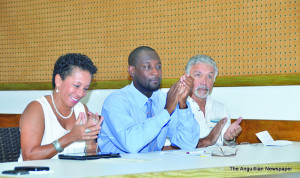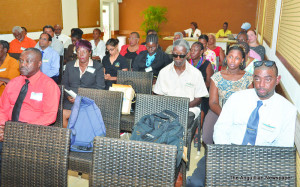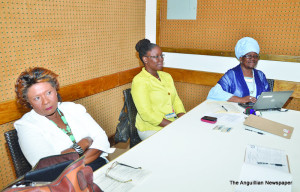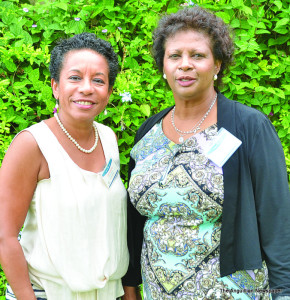


Ms Ijahnya Christian

Anguilla is making a significant step forward in gaining recognition of what is considered to be a significant part of the island’s national documentary heritage – ‘the Holy Piby.’
The move towards that recognition came up at a Regional Consultative Workshop on Memory of the World held in Anguilla at La Vue Boutique Inn on June 5 and 6. The consultation, attended by delegates from twelve Caribbean countries, was co-hosted by the Government of Anguilla and the UNESCO Caribbean office in Kingston, Jamaica. During the event, there was a presentation on the Holy Piby by Ms Ijahnya Christian who travelled to Anguilla from Ethiopia for that purpose. There was also a review of a number of nominations for UNESCO recognition submitted by several Caribbean territories.
The Holy Piby, commonly known as the ‘Black Man’s Bible,’ was written in the early 1900s by Robert Athyli Rogers, an Anguillian. It lit a fire among diamond workers in Kimberley, South Africa, and is acknowledged as the earliest of the foundational texts influencing the thinking and doctrines of the Rastafarian Movement. The local Memory of the World Committee has identified the Holy Piby as the first piece of documentary heritage which Anguilla is proposing for the UNESCO International Memory of the World designation.
Mr Jerome Roberts, Minister of Home Affairs, said the Anguilla Government was cognisant of the challenges endangering the documentary heritage of Anguilla and the need for preservation. “Anguilla has a vast reserve of documentary heritage of great cultural value,” he stated. “There are documents, manuscripts, oral traditions in print, audio and visual material, related to the Anguilla Revolution, Sombrero Island, the salt industry and jollification, just to name a few. It is vitally important that we take all measures to preserve our documentary heritage – not only for the sake of preservation – but also for the youth of today and generations to follow.”
Mr David Carty, Chairman of the local Memory of the World Committee, said that the grouping was well-supported in its efforts to have the Holy Piby inscribed on the UNESCO International Memory of the World register. Apart from the Government, that support included Mr Bobby Athyli Rogers, the author’s grandson; and his family members Ms Ijahnya Christian of the Robert Athyli Rogers Study Centre, and Mrs Audrey Rogers.
Ms Christian, who delivered a presentation on the Holy Piby at the recent Anguilla Lit Fest, commented: “Anguilla is showing a refreshing new readiness to come to terms with who we, are and to understand the great contributions we can continue to make, as a people, in this ongoing journey of self-knowledge for self-determination. This is what inspired the leaders and heroes of the Anguilla Revolution. The Holy Piby will be a rich addition to the UNESCO register and I am thrilled to be part of the process.”
Speaking following the opening ceremony of the consultation, chaired by Mr Foster Rogers, Permanent Secretary, Tourism, Ms Christine Norton, Director and Representative of UNESCO Caribbean Cluster, spoke to The Anguillian about Anguilla’s participation in the Memory of the World process.
“First of all, I think certainly that Anguilla’s leadership in the process here, in the Caribbean, is very, very important – not only for the Caribbean as a whole, but also for Anguilla,” Ms Norton said. “The question of ensuring the preservation of documentary heritage is highly important for the Caribbean and for the world. I certainly think that the involvement of Anguilla in this process is something that is extremely commendable, and I hope that it will lead to ensuring the documentary heritage here in Anguilla is preserved and protected and shared. I think the need for access for the public is the most important thing. People need to understand the value of the entire Memory of the World and what it means for us and future generations.”
Asked whether there was a possibility for some financial assistance to be provided to Anguilla for the above purpose, Ms Norton replied:
“Yes. I think most countries in the Caribbean – and I imagine that Anguilla would be faced with the same challenges as how to take steps to protect documentary heritage once we identify it and how can we afford to do it. I think there will be an effort on the part of the Kingston Jamaica, office to try to put together whatever proposals we require to seek the funding necessary to support countries. I have no guarantees because this is always a challenge for middle income countries, but I certainly think that we can basically say that Kingston is supportive of this whole effort by Governments of the Caribbean. We will do all in our power to ensure that steps can be taken that this documentary heritage is protected.”
Meanwhile, Ms Jasmin Garraway, a consultant with the Memory of the World Committee in Anguilla, was asked to comment on other areas in which UNESCO might be able to provide assistance. “As you know, we at the Ministry have been looking at the whole tourism product development,” she responded. “We are at that stage of implementing the Master Plan and a lot of it is focussed on heritage tourism. We have looked at the plantation history of the island; the salt-mining history; the maritime history; and the Amerindian heritage. We feel that these are the areas that, in the short-term, are quick wins or low-hanging fruit, and these are the ones we are working on right now.”







